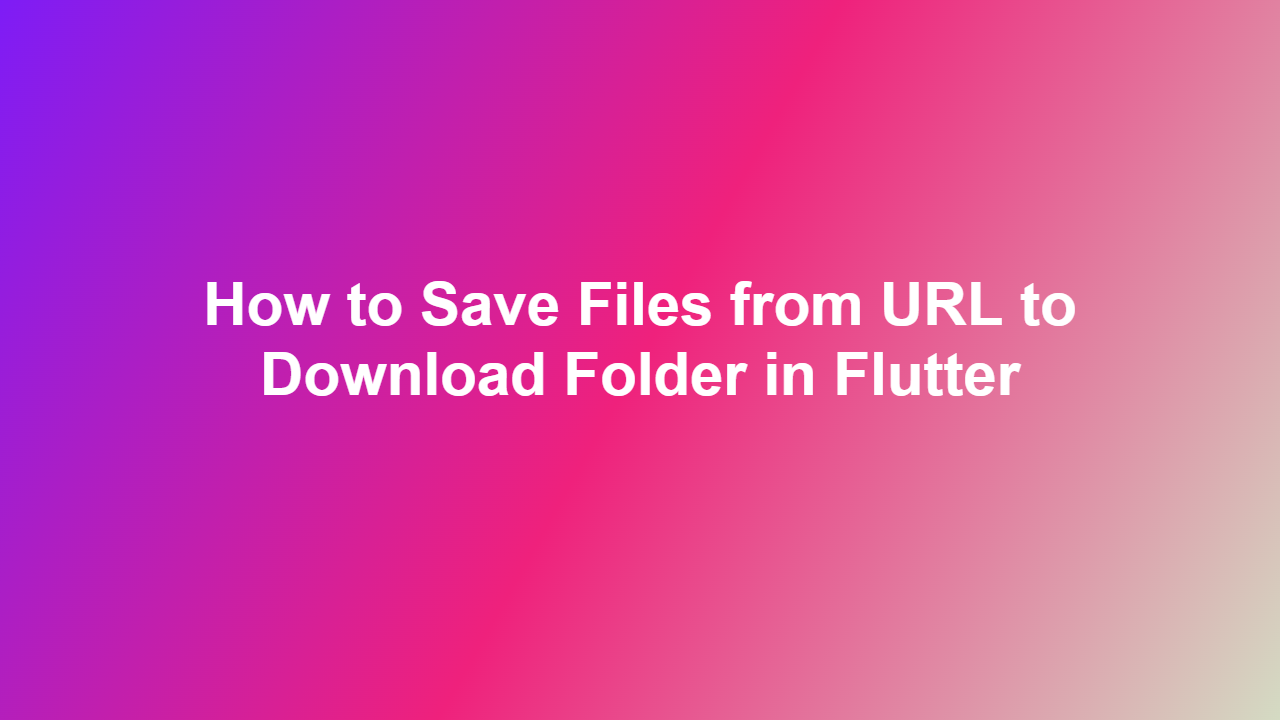How to Save Files from URL to Download Folder in Flutter
Introduction
Flutter is a popular framework used for developing cross-platform mobile applications. One common requirement in many mobile apps is to download files from a URL and save them to the device’s download folder. This can be achieved using the `dio` and `path_provider` packages in Flutter. In this blog post, we will discuss how to save files from a URL to the download folder in Flutter.
Adding Dependencies
To start with, you need to add the `dio` and `pathprovider` packages to your `pubspec.yaml` file. The `dio` package is used for making HTTP requests, while the `pathprovider` package is used for getting the download folder path.
Downloading Files
To download a file from a URL, you can use the `dio` package. You can use the `get` method of the `Dio` object to send a GET request to the URL and get the file. The file can then be saved to the download folder using the `path_provider` package.
“`dart
import ‘package:dio/dio.dart’;
import ‘package:pathprovider/pathprovider.dart’;
import ‘package:path/path.dart’;
class FileDownloader {
Future
final dio = Dio();
final response = await dio.get(url, options: Options(responseType: ResponseType.stream));
final directory = await getApplicationDocumentsDirectory();
final filePath = join(directory.path, ‘file.txt’);
await response.data.stream.pipe(File(filePath).openWrite());
}
}
“`
Saving Files to Download Folder
To save the downloaded file to the download folder, you can use the `path_provider` package to get the download folder path. You can then use this path to save the file.
“`dart
import ‘package:pathprovider/pathprovider.dart’;
import ‘package:path/path.dart’;
class FileSaver {
Future
final dio = Dio();
final response = await dio.get(url, options: Options(responseType: ResponseType.stream));
final directory = await getDownloadsDirectory();
final filePath = join(directory.path, ‘file.txt’);
await response.data.stream.pipe(File(filePath).openWrite());
}
}
“`
Example Use Case
Here’s an example of how to use the `FileDownloader` and `FileSaver` classes to download a file from a URL and save it to the download folder.
“`dart
class MyWidget extends StatefulWidget {
@override
MyWidgetState createState() => MyWidgetState();
}
class _MyWidgetState extends State
@override
Widget build(BuildContext context) {
return ElevatedButton(
child: Text(‘Download File’),
onPressed: () async {
final fileDownloader = FileDownloader();
await fileDownloader.downloadFile(‘https://example.com/file.txt’);
},
);
}
}
“`
Conclusion
In this blog post, we have discussed how to save files from a URL to the download folder in Flutter. We have used the `dio` and `path_provider` packages to achieve this. We have also provided an example use case to demonstrate how to use the `FileDownloader` and `FileSaver` classes.
Frequently Asked Questions
Q: What is the `dio` package used for?
A: The `dio` package is used for making HTTP requests in Flutter.
Q: What is the `path_provider` package used for?
A: The `path_provider` package is used for getting the download folder path in Flutter.
Q: How do I add the `dio` and `path_provider` packages to my project?
A: You can add the `dio` and `path_provider` packages to your project by adding them to your `pubspec.yaml` file.
Q: Can I use the `dio` package to download files in the background?
A: Yes, you can use the `dio` package to download files in the background.
Q: How do I get the download folder path in Flutter?
A: You can get the download folder path in Flutter using the `path_provider` package.
